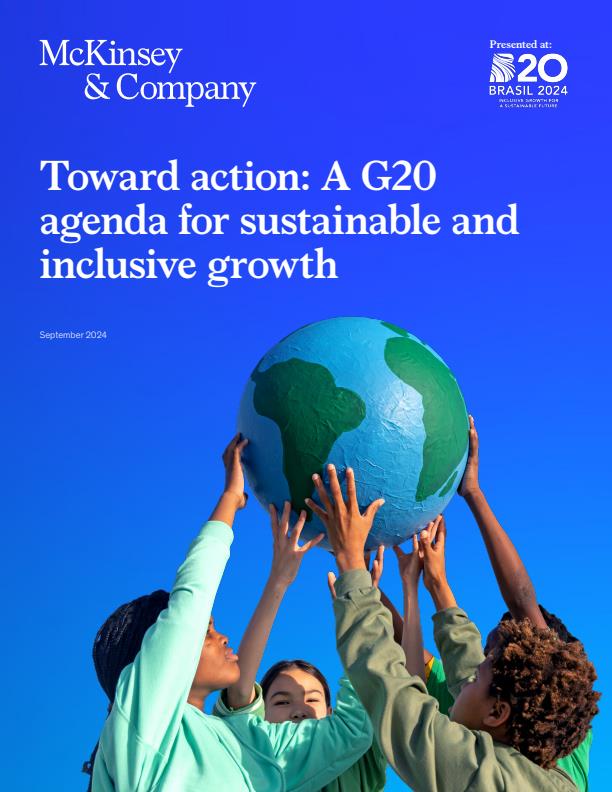Achieving sustainable, inclusive growth across G20 economies will take decisive effort. This report offers metrics to prompt discussions at the B20 forum and move from aspirations toward action.
In the face of global challenges, the G20 has a pronounced role in achieving three important societal goals: raising living standards to achieve economic empowerment, mitigating climate change through net-zero efforts, and, to support these goals, boosting economic growth with a focus on productivity.
In recent years, the B20—the global business forum for the G20—has put sustainable and inclusive growth at the top of its agenda. At the previous two B20 forums, McKinsey research highlighted the interconnected systems that support such sustainable and inclusive growth. This year, our focus is on how countries can move from aspirations toward action in the three pillars of growth, inclusion, and sustainability.
- As G20 economies aim to further economic inclusion, they can aspire to raise all people to the ‘empowerment line,’ enabled by growth. This line is the threshold of consumption, well above extreme poverty, at which people can afford essential goods and services, build savings, and achieve their potential. In 2020, about 4.7 billion people (approximately 60 percent of the global population) were living below the economic empowerment line.1 Lifting the entire population above this threshold requires economic growth, affordability of essential goods, and reduced inequality to varying degrees in different countries.
- Simultaneously, G20 economies face the challenge of reducing emissions even as energy demand rises with economic growth. While progress on reducing greenhouse gas emissions within the G20 is encouraging, overall emission levels are expected to stay higher than the level likely needed to limit temperature increases to 1.5°C above preindustrial levels, even if emission-reduction commitments are achieved by 2030.2 This reinforces the challenge of achieving a steeper emissions reduction path while also ensuring reliable, affordable access to energy and supporting industrial competitiveness. Middle-income G20 economies in particular face the challenge of balancing rising energy demand from growth with reducing emissions.
- Progress toward both goals can be aided by productivity growth, but that has slowed recently. MGI research finds that accelerated economic growth could take the world halfway to achieving both economic inclusion and emissions reductions by lifting households above the empowerment line and allowing for greater funding and technology advances for the energy transition.3 Yet productivity growth, a crucial enabler of long-term economic growth, has fallen from a CAGR of 3.4 percent in 2002–07 to 2.1 percent in 2016–22 in G20 economies.4 Reversing this decline calls for reigniting capital investment, preparing workers for jobs with higher future demand, and enabling technological development and adoption.
- G20 economies can facilitate partnerships to achieve goals of productivity growth, emissions reduction, and economic inclusion. Investment in low-emission assets to get on a pathway to net zero, along with bringing all households to the empowerment line, means turning big aspirations into practical strategies with useful metrics. To get there, G20 economies can build national and private sector partnerships to coordinate action, track progress, and share lessons learned.



